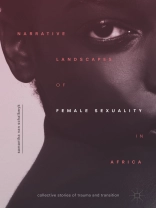This book explores the textures of women’s narratives of patriarchal oppression of female sexuality. Postcolonial feminist scholars in Africa highlight the importance of moving beyond Westernised lenses of ‘African’ women’s powerlessness, towards a focus on women’s culturally-specific sexual agency. However, few studies explore women’s psychological experiences of sexual oppression/agency in real depth. Narrative Landscapes of Female Sexuality in Africa traces the narratives of heterosexual migrant women from Zimbabwe, Kenya and Congo. The book offers insight into women’s experiences ‘back home, ’ travelling through border posts in Africa, and life in current post-apartheid South Africa. Through a unique collectively-based methodology and a feminist poststructuralist lens, the author examines narrative strategies used by the women to manage and psychologically resist harmful discourses surrounding female sexuality and women’s bodies. The book offers rich exploration of the intersections of gender and sexuality, class, race and citizenship situating the narratives within the wider context of poverty and migration in sub-Saharan Africa. These vectors of oppression are illuminated throughout the text via integrated threads of the researcher’s positionality in relation to the women narrators.
Inhoudsopgave
1.Introduction.- 2. Migrant Subjectivities in South Africa: Contextualizing the Women’s Voices.- 3. Collective Biography: A New Chapter for Exploring the Agency and Transformation of Women in the African context.- 4. Culture, Femininity, and Woman Abuse: The Case of Mubobobo Rape.- 5. Crossing Borders in Africa: Collectively Narrating the Foreigner Within.- 6. Psycho-Social Borders and Imagining the Female Other: Shame as a remnant of violent gendered abuse.- 7. Conclusion.
Over de auteur
Samantha van Schalkwyk is Senior Researcher in Historical Trauma & Transformation Studies at Stellenbosch University, South Africa. She has published in international peer-reviewed journals such as
Feminism & Psychology and Violence against Women and is lead editor of the book
A Reflexive Inquiry into Gender Research: Towards a New Paradigm of Knowledge Production.












